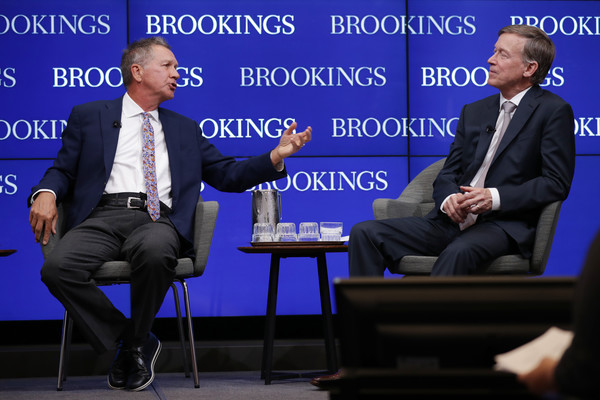Is National Service the Key to Help “Forgotten Americans”?

Low-wage Americans without college degrees – a group President Trump labeled “the forgotten Americans” on the campaign trail – have gotten the attention of national media and policymakers after Trump’s surprise victory. The election exposed continued economic stagnation among low- and middle-income Americans, as well as deep cultural and political divides.
In a new book, former Clinton administration official Isabel Sawhill argues that national service, along with changes to the tax code to boost workers’ take-home pay, could help address America’s tribalism while simultaneously connecting young people to work. At an event last week in Washington, Sawhill – now a senior fellow at the Brookings Institution – described the proposals she outlines in The Forgotten Americans: An Economic Agenda for a Divided Nation as a kind of moderate compromise.
“One way to characterize my book is an attempt to move to the center,” said Sawhill. “To marry red state values about education, work, and family with blue state policies that would actually help people in practical ways.”
The event also featured a conversation with Governors John Kasich (R-OH) and John Hickenlooper (D-CO), who jokingly acknowledged rumors they may form a bipartisan ticket for president in 2020. The two agreed that the American education system is deeply flawed, and that new skills training programs are needed to help workers navigate a rapidly changing economy.
Kasich and Hickenlooper stressed that income and wealth inequality are central to the nation’s problems.
“There is a problem of division between the haves and the have-nots,” Kasich said. “We need to give middle- and low-income people access to equity. Rich people ride the market up, but other people don’t have the resources to do so. And obviously there are solutions like raising the minimum wage, but honestly those things are just fiddling on the margins.”
“We’ve been focusing on very narrow corrections to inequality within our form of capitalism without addressing the larger-scale issues,” Hickenlooper agreed. “Widespread automation is threatening not just jobs but whole professions. And our political system has done nothing.”
Sawhill’s research included conversations with people in Syracuse, NY; Greensboro, NC; and St. Louis, MO. She said that the “forgotten Americans” tend to agree that skills training is crucial but are skeptical of the value of college; stress the importance of personal responsibility, rather than larger structural barriers; and are deeply cynical about the government’s ability to solve problems.
She also said that the idea of a year of national service for young people was extremely popular among this group.
“To address our cultural discontents – our tribalism – I also propose a new twist to this idea by proposing that we ask American families to open their homes and host a young person during their year of service,” said Sawhill. “The people I talked to while doing my research loved this idea.”
During a panel discussion following Sawhill’s remarks, Eric Rodriguez, vice president at UnidosUS, endorsed the national service proposal, saying it was one of the rare policy ideas that “humanizes” communities.
“I firmly believe at this stage that racial resentment, racial animus, and identity are far more important than we give them credit,” said Rodriguez. “That hinders our ability to come together around a common economic agenda.”
Sawhill and the two governors agreed on a central idea: for bipartisan discussions about policy to improve, Americans first need to agree on a set of common principles. Hickenlooper worried that “right now, any time you compromise you’re seen as a victim or a traitor. Even the term ‘middle ground’ implies that you’re sacrificing something you believe in.”
“The trick is to figure out how to make the middle not boring,” said Kasich. “We need to find the principles that we agree on. The policy details are what we hammer out over time. But right now we’re not even agreeing on basic principles.”
